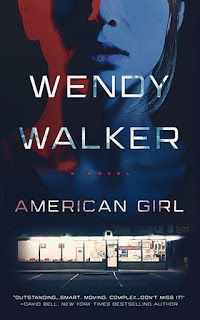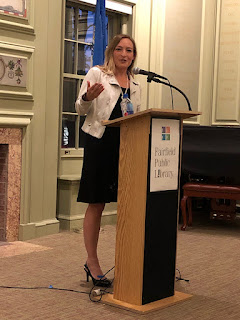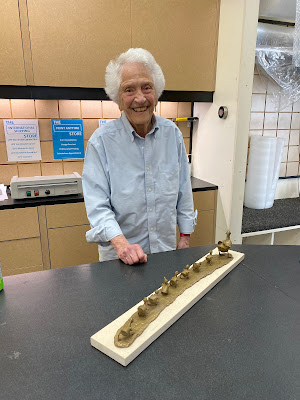HANK PHILLIPPI RYAN: It’s a question that gets asked at almost every author event: “Do you listen to music while you’re writing?” It’s also a very binary answer–every author can instantly tell you yes or no.
My answer below, and we cannot wait to hear yours. But first: confetti, champagne, and the strewing of rose petals! Here is the incredibly fabulous and astonishingly talented Lori Rader-Day to give us her musical secrets.
The Soundtrack of A StoryBy Lori Rader-Day
I’m going to tell you a tragic story in a minute, but first some back story and, right up front: controversy.
I write to music. I write to songs, with lyrics.
Many writers will argue against this. They will say that silence is better, or if they allow music anywhere near their writing practice at all, it can only be instrumental. The complaint? Many will say that the songs will somehow crawl into the work.
Whereas I welcome songs into my stories. Hear me out.
I have written all of my novels—seven books and counting—to music, and not just any music. I make playlists full of songs you’ve heard on the radio or never will, of songs that fall into genres as diametrically opposed as rap and country, big band and metal. Yes, in the same playlist.
Here’s how it works, for me. I start with a few songs I already know, songs I think I can write to. Maybe they have something to do with the story I have in mind, but maybe they just sound right for this particular book. Tone is the most important factor in song choice, and I can’t explain it well without, perhaps, a musician’s vocabulary for how music affects the listener. (There are full books on this, and I’m not writing one.) I’m not a musical expert, only a connoisseur of the song I can write to.
The moment I hear a song I can write to, I know it.
This is not the story I meant to tell you, but here goes: When I was writing my first novel, The Black Hour, I was struggling to find my way. (I’ve adopted this, the struggle, as part of my process, but I didn’t know it was necessary, then.) I was driving somewhere here in Chicago, always an adventure, when a song came on the radio I had never heard before. It was a fairly metal song I would later identify (and purchase, and listen to on repeat) as “Sail” by AWOLnation. (You may not like it, but… you might still like the book?) Sail! What could be more perfect? My book had a lake in it, and a boat, and a regatta—
Or maybe that regatta popped into my mind when I heard the song? It’s hard to remember how things went, now. I only know that this one song became the soundtrack of the second half of my draft. A single song led me out of the morass, that boggy middle ground of a novel’s first draft.
When I hear that song now, it’s such a thrill. It sends me right back to that time. Music is a time machine. I’ve been transported back to singular moments in my life, to the origins of friendships, to the best and worst days of my life, by a song playing over the speakers at a coffee shop or, god, the grocery store. Like the country song favored by the exchange student from my freshman dorm, circa 1991. (Garth Brooks, but with an English accent.) Or “It’s a Shame About Ray” by the Lemonheads, having the AUDACITY to play when I’m busy living my now middle-aged life.
Even as I’m telling you all this, I’m listening to music. A song starts that reminds me of the day I first heard it, and how it made me miss my dad, and now I’m missing my dad. A song is a feeling as well as the packmule that carries that feeling on its back, trailing behind you wherever you go.
Each book has a playlist, and each playlist has one song that goes straight to my memories of writing that book. “Sail” and then “Team” by Lorde for Little Pretty Things, “Blood in the Cut” by K.Flay for The Day I Died. “The Yawning Grave” by Lord Huron helped me finish Under a Dark Sky, and “This Is It” by Lo Moon helped me find the core of The Lucky One. There are both modern songs and contemporaneous ones in the playlist for the historical Death at Greenway; you’d almost be able to hum along with Vera Lynn singing “(There’ll Be Bluebirds Over) The White Cliffs of Dover” if you were reading chapter eleven.
A book’s playlist helps me work, and then lives on as a soundtrack for anyone interested and a monument, possibly for me alone, of that book’s creation.
All this to tell you the story I promised earlier, about how my playlist for The Death of Us blew up.
Let’s skip the technology part. I don’t know what happened. The book was done, so I could have just moved on. Very few people demand these musical lists. My friend Debby, basically.
But I didn’t. Instead, I painstakingly re-created the playlist from my memories of the process of writing The Death of Us and from its themes and characters. Which song made me think of Lissette’s love for her son? (“Oh My Heart” by REM.) Which song’s spoken portion always took me out of the writing but earned its spot by helping me center the story in its earliest, most fragile days? (“Family and Genus” by Shakey Graves.) Late in the process of rebuilding the playlist, I suddenly recalled “I Don’t Mind,” the perfect Sturgill Simpson song that helped me capture my town marshal character’s heart, and happily added it back. I built the book again in reverse, an exercise that helped me sort out what my book was really about: family, sacrifices and betrayals, secrets, and the choices that make a family.

Writers don’t often revisit our work after edits are closed, but there was something satisfying about the rediscovery of the music that had helped me write The Death of Us, a book whose creation had run along parallel tracks to the most challenging months of my life, through cancer treatment.
No project of mine so far has been totally joyous—the struggle, as I said, is part of my process—but writing this book was medicine, towing me along through the tough spots even as I started to pull apart at the seams. Its soundtrack, now, is the packmule, loaded down not just with the book but with my survival.
I couldn’t have left these songs behind if I’d tried. They would have waited for me in the speakers of some coffee shop in the future or, god, the grocery store. But because I rebuilt the list, I offer them to you now: The Death of Us playlist.
In fact the very best thing about writing to music is that it gives me an excuse to discover new artists and a chance to share the treasures I’ve found—supporting other creative people along the path of my own creative life.
Oh, my heart. It has always belonged to music, even if I can’t sing a note. I’ve already started building the next list for the next book. I hope you all like Patsy Cline.
HANK: Oh, I adore Patsy Cline! And now I am singing. To myself. Because –as you well know, I am the world’s worst singer, truly, and the good news/bad news is that when I try to sing, I can completely hear how awful it is. Luckily for the rest of the world.
Oh, I forgot to say. Ah....usually I prefer quiet. I have had my musical inspirations, though...but usually away from the computer. I do have to admit, a climactic scene of TRUST ME was written to Prokofiev. Played live by the Boston Symphony. Long and wonderful story.
How about you, Reds and Readers?
Lori Rader-Day (here with Clementine) is the Edgar Award-nominated and Agatha, Anthony, and Mary Higgins Clark award-winning author of Death at Greenway, The Lucky One, Under a Dark Sky, and others. Her latest book is The Death of Us (Harper Collins.) Lori lives in Chicago, where she co-chairs the Midwest Mystery Conference and teaches creative writing at Northwestern University. Visit her at www.LoriRaderDay.com.
THE DEATH OF US
From the award-winning author of Death at Greenway and The Lucky One comes a chilling suspense novel in which the discovery of a submerged car in a murky pond reveals betrayals and family secrets that will tear a small town apart.
One rainy night fifteen years ago, a knock at the door changed Liss Kehoe’s life forever.
On that night, Ashley Hay stood on Liss’s front porch and handed over her brand-new baby Callan.
She was never seen or heard from again.
Since then, Liss has raised Callan as her own, and loves him as fiercely as any mother would. But in the back of her mind, she’s always wondered whether Ashley is still out there somewhere—and feared what might happen if she comes back.
When Ashley does reappear, it’s not in the way Liss expected. After all these years, Ashley’s car has been found… in the quarry pond on Kehoe property. But the discovery of the car dredges up more questions than answers. What really happened on the night of Ashley’s disappearance? Was it a tragic accident, or something far more sinister? Someone in town knows the truth, and they’ll go to great lengths to keep it quiet.
As tensions rise in the small community, Liss must fight to protect her family and keep her own secrets hidden—or risk losing everything she loves.
PS form Hank. This is SUCH a terrific book! Friday NIght Lights goes psychologically sinister–with the heartbreaking knowing voice of LRD. Do not miss it!












.png)



.jpg)

.jpg)
